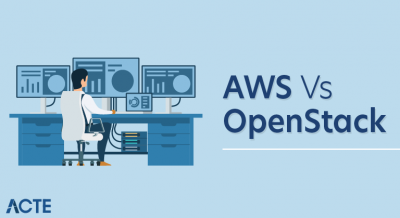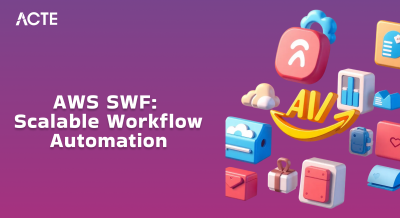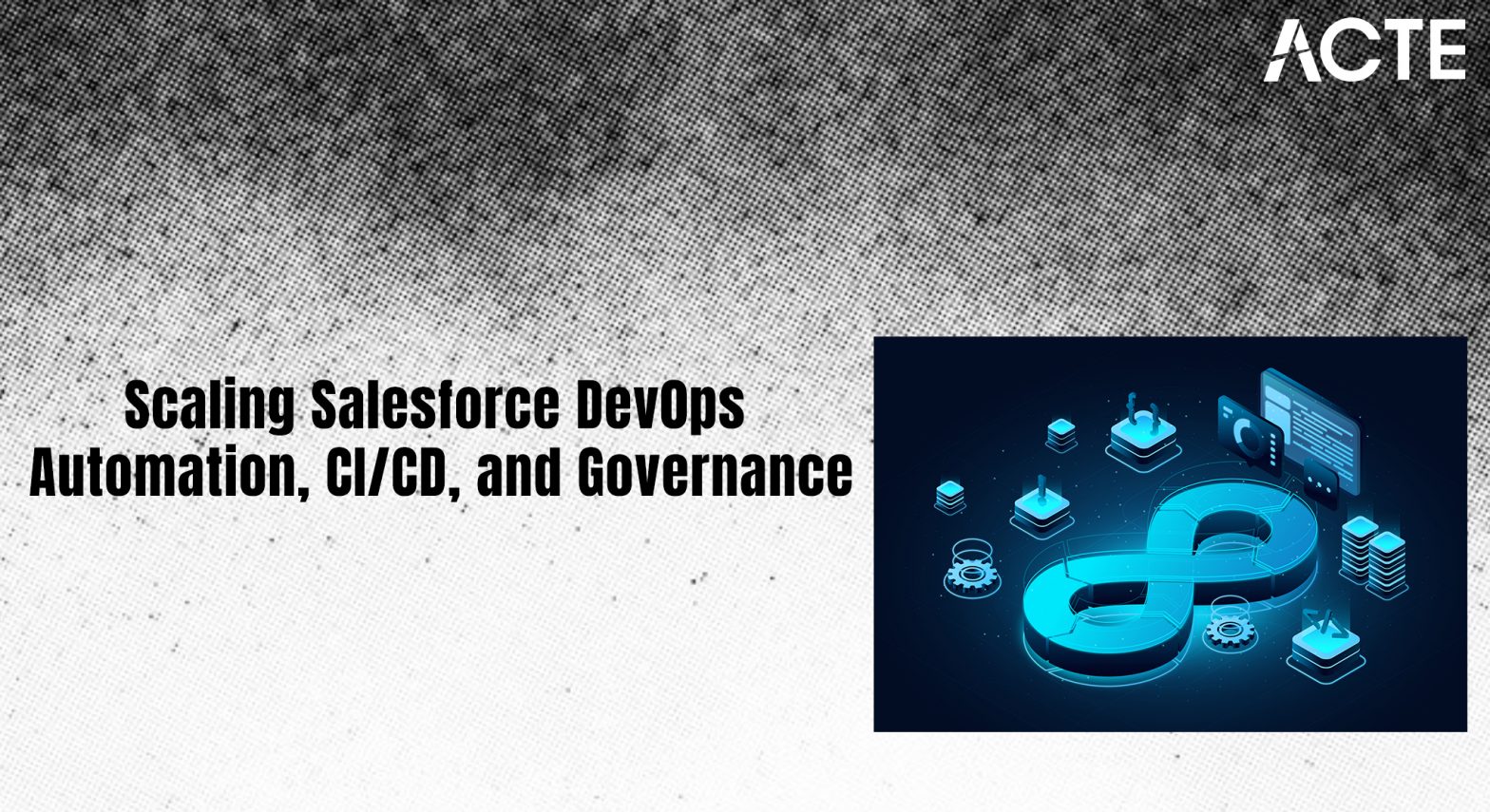
- What is Salesforce DevOps?
- Why is DevOps Crucial for Salesforce in 2025?
- Key Benefits of Salesforce DevOps
- Key Principles of Salesforce DevOps
- The Salesforce DevOps Lifecycle
- Tools and Technologies for Salesforce DevOps
- Best Practices for Salesforce DevOps in 2025
- Challenges in Salesforce DevOps and How to Overcome Them
- The Future of Salesforce DevOps
- Conclusion
What is Salesforce DevOps?
Salesforce DevOps is a combination of cultural philosophies, practices, and tools that increase an organization’s ability to deliver applications and services at high velocity. It combines the development and operations of Salesforce applications to improve the quality of deployments and reduce the time Salesforce Training takes to deliver changes to users. Salesforce DevOps focuses on automating and streamlining the entire development lifecycle, from planning and coding to testing, deployment, and monitoring. It helps Salesforce teams manage code, configurations, data, and environments in an integrated manner, ensuring that updates are delivered seamlessly. Salesforce DevOps also emphasizes continuous feedback, enabling teams to quickly detect and address issues throughout the development cycle. By leveraging automation, it reduces manual errors and ensures consistency across various environments such as development, testing, and production. This approach fosters better collaboration between development and operations teams, breaking down silos and aligning everyone towards common goals. Additionally, DevOps practices help in scaling Salesforce environments more efficiently, ensuring that both small and large-scale updates are managed effectively. Ultimately, Salesforce DevOps supports faster delivery of high-quality features that align with business objectives and user needs.
Why is DevOps Crucial for Salesforce in 2025?
As Salesforce adoption continues to grow, organizations are increasingly customizing the platform to meet their specific needs. Custom objects, workflows, Lightning components, and Apex code are just some of the ways in which Salesforce users modify the platform to create bespoke solutions. However, managing these customizations becomes increasingly complex as an organization’s Salesforce instance grows. To solve these problems and accelerate Salesforce development, Salesforce vs Salesforce Platform practices become essential. By automating deployments, testing, and version control, Salesforce teams can streamline their workflows, reduce risk, and improve collaboration. This complexity leads to several challenges, such as:
- Manual deployment processes: Deployments often involve manual processes that are time-consuming and error-prone.
- Lack of environment consistency: Multiple environments (development, testing, production) can become out of sync, causing deployment issues.
- Version control challenges: Without a structured DevOps process, versioning and tracking changes to Salesforce metadata becomes a challenge.
- Risk of errors and downtime: Without automated testing and deployment, there is a higher risk of introducing bugs and disrupting production systems.
Become a Salesforce expert by enrolling in this Salesforce Training today.
Key Benefits of Salesforce DevOps
Salesforce DevOps brings a wealth of benefits to organizations, making it an indispensable approach for modern Salesforce development. These benefits include, By implementing Salesforce DevOps, teams can streamline the process of releasing new features and updates. Automation allows for faster and more frequent releases, which helps businesses stay competitive in a rapidly changing market. DevOps fosters collaboration between development and operations teams. In a Salesforce context, it means developers, administrators, and release managers can work together more efficiently to ensure that updates and customizations are rolled out smoothly. Automating testing and integrating continuous integration/continuous deployment (CI/CD) practices ensures that every piece of code and configuration is thoroughly tested before deployment. This results in higher-quality applications and fewer errors in production. With DevOps tools, Salesforce environments are better controlled and synchronized, reducing the risk of discrepancies between development, testing, and production environments. By automating deployments, error-prone manual Omni Channel Salesforce are eliminated. DevOps also encourages incremental updates rather than large, risky releases, which further reduces the potential for failure. Moreover, Salesforce DevOps enhances visibility into the development process by providing real-time monitoring and tracking of deployments and performance metrics. This allows teams to quickly identify and address any issues that may arise, ensuring smooth operations. With improved version control and collaboration tools, DevOps also promotes a culture of continuous improvement, where teams can learn from past deployments and enhance future processes. By focusing on automation and best practices, Salesforce DevOps not only accelerates delivery cycles but also ensures a more secure and reliable system. Ultimately, adopting DevOps practices within Salesforce leads to more efficient workflows, better resource management, and faster delivery of high-value features to end-users.
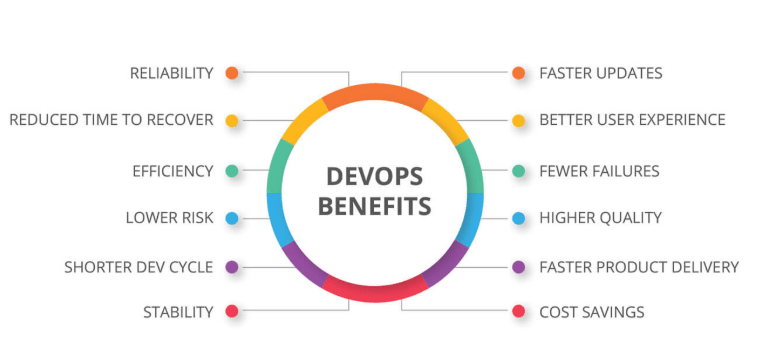
Key Principles of Salesforce DevOps
Salesforce DevOps is based on several key principles that guide the methodology. These principles help teams improve their development and deployment practices:
- Automation: Automating repetitive tasks like testing, deployment, and environment provisioning is a core principle of DevOps. Manage User Access with Salesforce Permission Sets minimizes manual intervention and ensures consistency across environments.
- Collaboration: DevOps is all about bridging the gap between development and operations teams. By working together and sharing knowledge, teams can deliver better solutions faster. Integration and Continuous Delivery (CI/CD): Salesforce DevOps emphasizes continuous integration (CI) and continuous delivery (CD). Developers frequently commit code to the version control system, and automated testing and deployment processes ensure that new code is integrated and delivered quickly and safely.
- Version Control: Version control systems (VCS) like Git are essential to Salesforce DevOps. They track changes in metadata, code, and configurations, providing a clear history of changes and enabling easy rollback if something goes wrong.
- Monitoring and Feedback: Salesforce DevOps encourages teams to monitor production environments and provide feedback loops to improve future development cycles. This ensures that the platform is continuously optimized and evolving to meet business needs.
- Salesforce CLI: Salesforce Command Line Interface (CLI) is a powerful tool for managing Salesforce metadata and data. It can be used for tasks such as retrieving metadata, deploying changes, and running tests.
- Git: Git is a distributed version control system widely used in DevOps for tracking changes to Salesforce code and metadata. Salesforce Training enables teams to collaborate on code and ensures versioning consistency across environments.
- Gearset: Gearset is a popular third-party tool for Salesforce DevOps that integrates with Git and provides automated deployments, backup, and testing capabilities. It simplifies the release management process for Salesforce teams.
- Jenkins: Jenkins is an open-source automation server that facilitates continuous integration and continuous delivery. Salesforce teams can use Jenkins to automate the build, test, and deployment process.
- Copado: Copado is a dedicated DevOps solution for Salesforce. It supports version control, automated deployments, and continuous integration, specifically designed for Salesforce environments.
- Complexity of Multiple Environments: Maintaining consistency across multiple environments (development, testing, production) can be challenging. Using automated deployment tools and CI/CD pipelines can help ensure consistency.
- Limited Out-of-the-Box DevOps Features: Salesforce has limited native DevOps functionality compared to traditional development platforms. To address this, organizations often rely on third-party tools like Salesforce Sandbox Explained and Gearset.
- Lack of Skilled Resources: Finding skilled Salesforce DevOps professionals can be difficult. Training existing team members or partnering with specialized consultants can help mitigate this challenge.
Advance your Salesforce career by joining this Salesforce Training now.
The Salesforce DevOps Lifecycle
The Salesforce DevOps lifecycle consists of several key stages that ensure smooth and efficient development, testing, deployment, and monitoring of Salesforce applications. In the planning stage, teams define the scope of work, which includes identifying new features, bug fixes, or configuration changes. This phase often uses tools like Jira or Trello to track tasks and ensure alignment with business goals. In the development stage, developers work on creating and customizing applications using tools like Apex code, Lightning components, and other Salesforce resources. Version control systems are crucial at this point to track and manage code changes, ensuring that the development process remains organized. Once the Future Method in Salesforce is ready, the testing stage begins, where automated tests such as unit tests, integration tests, and end-to-end tests are run to verify that the code performs as expected and doesn’t introduce new bugs. After successful testing, the deployment stage kicks in, where changes are moved to production environments using tools like Salesforce CLI, Change Sets, or third-party platforms like Gearset, ensuring that updates are released efficiently. Finally, in the monitoring phase, Salesforce environments are continuously observed for performance issues, errors, and user activity. Tools provide real-time feedback to identify potential improvements and optimize system functionality. This structured approach ensures a continuous flow of high-quality features and updates, reducing risks and enhancing the overall user experience.
Tools and Technologies for Salesforce DevOps
There are several tools and technologies available to support Salesforce DevOps. These tools help with version control, CI/CD pipelines, automated testing, and deployment. Here are some of the most popular tools:
Ready to excel in Salesforce? Enroll in ACTE’s Salesforce Master Program Training Course and begin your journey today!
Best Practices for Salesforce DevOps in 2025
Implementing Salesforce DevOps requires a strategic approach and adherence to best practices to ensure the process runs smoothly and efficiently. One of the most crucial practices is to use version control for everything. This means storing every piece of metadata, code, and configuration in a version control system, which allows teams to track changes, resolve conflicts, and easily roll back to previous versions if necessary. Automating testing is another key practice—unit tests, integration tests, and regression tests should all be automated to ensure that new code is thoroughly vetted before deployment. Salesforce offers tools like Apex Test Execution to assist in this process. Additionally, it’s important to establish a CI/CD pipeline that integrates continuous integration and continuous delivery, ensuring code is frequently integrated, tested, and deployed without manual intervention, accelerating the release cycle. Collaboration across teams is essential for successful Salesforce DevOps—developers, administrators, and other stakeholders must work closely together to ensure that customizations meet the business’s needs. Finally, Guide to Salesforce Campaign critical to monitor and optimize your Salesforce applications in real-time, using monitoring tools to track performance and gather feedback for continuous improvement. This approach ensures a streamlined and effective DevOps process that delivers quality, performance, and innovation.
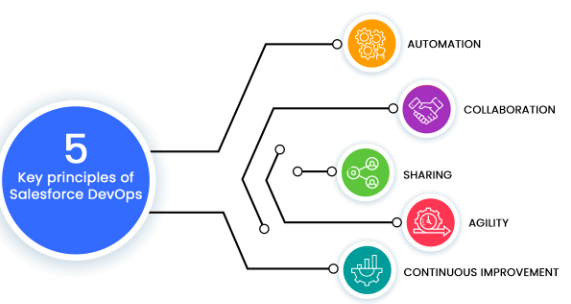
Challenges in Salesforce DevOps and How to Overcome Them
While Salesforce DevOps provides many benefits, it also comes with its own set of challenges:
Are you getting ready for your Salesforce interview? Check out our blog on Salesforce Interview Questions and Answers!
The Future of Salesforce DevOps
Looking ahead to 2025 and beyond, Salesforce DevOps is poised for continued evolution, with significant advancements on the horizon. We can expect increased automation, as more tasks are automated, reducing manual intervention and speeding up deployments, allowing teams to focus on higher-value activities. Greater integration with AI and machine learning will also play a pivotal role, helping to optimize deployments, predict potential issues, and provide valuable insights throughout the development lifecycle. Additionally, enhanced collaboration tools will Understanding the Salesforce Security Model, enabling teams to work more seamlessly across various environments, improving communication and reducing friction in the development process. As Salesforce DevOps matures, advanced monitoring capabilities will become standard, providing real-time insights and proactive problem-solving. Finally, smarter analytics tools will surface, helping organizations make data-driven decisions that drive efficiency and continuous improvement in the Salesforce environment. With these advancements, Salesforce DevOps will become even more streamlined and powerful, further empowering businesses to innovate and stay ahead in a fast-paced digital world.
Conclusion
Salesforce DevOps is a powerful methodology that enables organizations to streamline their development, testing, and deployment processes. By integrating best practices, using the right tools, and focusing on automation, Salesforce teams can improve productivity, enhance collaboration, and ensure faster, more reliable releases. As Salesforce continues to grow and evolve, mastering Salesforce Training will become even more essential for organizations looking to stay competitive and agile in the market. By following this guide and implementing Salesforce DevOps, you’ll be well-positioned to succeed in 2025 and beyond. With continuous improvements in automation, AI integration, and cross-team collaboration, the Salesforce DevOps landscape will provide even more opportunities to optimize business processes. Embracing these innovations will allow your organization to be more responsive to market demands, drive higher customer satisfaction, and maintain a competitive edge in the evolving CRM space. As the digital landscape changes, leveraging the full potential of Salesforce DevOps will be key to unlocking operational efficiency and business growth.

